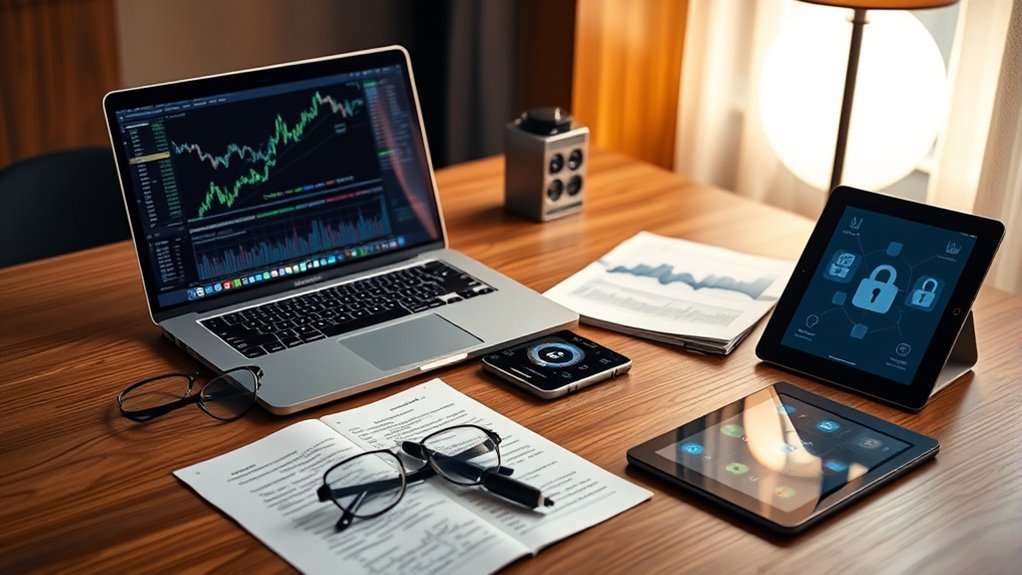To guarantee your digital assets and cryptocurrency investments are secure, you should conduct thorough due diligence by verifying platform licenses, security measures, and compliance with regulations like AML and KYC. Use platforms with strong security protocols such as multi-factor authentication and cold storage. Check their reputation and track record for transparency and past breaches. By understanding these essentials, you’ll build a solid foundation for safe investing—and there’s more to discover that can help protect your assets further.
Key Takeaways
- Verify platform compliance with AML/KYC regulations and obtain necessary licenses to reduce legal risks.
- Assess platform reputation by reviewing security history, user feedback, and transparency of security measures.
- Ensure the platform employs robust security protocols such as multi-factor authentication and cold storage.
- Conduct thorough due diligence on service providers’ track record and adherence to regulatory standards.
- Stay informed about legal requirements and implement strong security measures to protect assets and ensure long-term success.

Are you confident that your digital asset investments are secure and well-informed? The world of cryptocurrency and digital assets is fast-moving and complex, making thorough due diligence essential. One of the most critical aspects of protecting your investments is understanding and ensuring compliance with relevant regulations. Regulatory compliance isn’t just about following laws; it’s about safeguarding your assets from legal issues, fraud, and scams. Different jurisdictions have varying rules around digital assets, so you need to stay updated on local and international regulations. This might involve verifying that the platforms you use adhere to anti-money laundering (AML) and know-your-customer (KYC) standards. By choosing compliant exchanges and wallets, you reduce the risk of losing assets due to legal actions or platform shutdowns. Staying compliant also means you’re more likely to have access to dispute resolution mechanisms, ensuring your rights are protected if issues arise.
Ensuring compliance with regulations is key to safeguarding your digital asset investments.
Security protocols are equally crucial. Digital assets are prime targets for cybercriminals, so implementing robust security measures is non-negotiable. You should look for platforms that utilize multi-factor authentication (MFA), encryption, and cold storage options. Never underestimate the importance of strong, unique passwords and regularly updating them. Beware of phishing schemes that try to steal your credentials, and always verify the authenticity of communications before clicking links or sharing sensitive information. Hardware wallets are one of the safest ways to store significant holdings, as they keep your private keys offline, away from potential online threats. Additionally, regularly review your security settings and stay informed about new threats and protective measures. Incorporating AI security technologies can further enhance your protection by detecting and responding to cyber threats in real-time.
Performing due diligence also involves scrutinizing the reputation and track record of the platforms and service providers you plan to use. Check for regulatory licenses, user reviews, and any history of security breaches. Transparency around security protocols and compliance measures is a good indicator that the platform takes your security seriously. You should also monitor ongoing updates from the platform regarding security patches and policy changes, as these often reflect how proactively they address emerging threats.
In essence, securing your digital assets requires a combination of understanding regulatory compliance and implementing strong security protocols. Staying informed about legal requirements helps you avoid unnecessary risks, while strict security measures protect your holdings from theft and fraud. When you approach your investments with diligence, you’re not just securing your assets—you’re building a solid foundation for long-term success. Remember, the effort you put into due diligence today saves you from potential headaches and losses tomorrow.
Frequently Asked Questions
How Do I Verify the Legitimacy of a New Cryptocurrency Project?
To verify a new cryptocurrency project’s legitimacy, start with a thorough white paper analysis to understand its goals, technology, and roadmap. Check the development team’s credentials and how transparent they are. Engage with the community on social platforms to gauge support and authenticity. If the project has active, transparent communication and clear, detailed documentation, it’s a positive sign you’re dealing with a legitimate initiative.
What Are the Common Scams in Digital Asset Investments?
You should watch out for common scams like pump and dump schemes, where prices are artificially inflated and then plummeted, leaving investors with losses. Fake ICOs are another red flag, pretending to be legitimate fundraising efforts but actually stealing your funds. Always verify project details, check for transparency, and avoid investments that promise guaranteed returns or seem too good to be true to protect yourself.
How Can I Assess the Security of a Cryptocurrency Wallet?
Did you know that over 20% of crypto users have experienced wallet hacks? To assess your wallet security, check if it uses strong encryption methods like AES-256 and multi-factor authentication. Make sure your wallet supports secure backup options and keeps private keys offline. Avoid sharing keys or using unsecured networks. Regularly update your wallet software and use reputable wallets to minimize vulnerabilities and keep your digital assets safe.
What Regulatory Considerations Should I Be Aware of Globally?
You should prioritize understanding regulatory compliance requirements in each country, as rules vary globally. Stay updated on global standards for cryptocurrency, such as AML and KYC policies, to avoid legal issues. Be aware of potential bans or restrictions in certain jurisdictions. By monitoring international regulations and aligning your activities with them, you reduce risks and guarantee your investments stay compliant across different regions.
How Do I Evaluate the Team Behind a Blockchain Startup?
Think of evaluating a startup like appraising a captain before setting sail. You look at their reputation and track record, much like checking a captain’s past voyages. Focus on the team’s expertise in blockchain tech, their experience, and whether their vision aligns with industry standards. Trust founders with a solid reputation, transparent communication, and a history of delivering results. This helps ensure your investment is in capable hands.
Conclusion
Think of your crypto journey as steering a vast, unpredictable ocean. Doing thorough due diligence is your sturdy compass, guiding you through choppy waters and hidden reefs. With careful research and vigilant checks, you’ll steer clear of storms and treasures lost to scams. Remember, your diligence isn’t just a safety net—it’s the lighthouse illuminating your path to smart, confident investments. Keep your eyes sharp and your ship steady, and you’ll sail smoothly toward your financial horizons.









